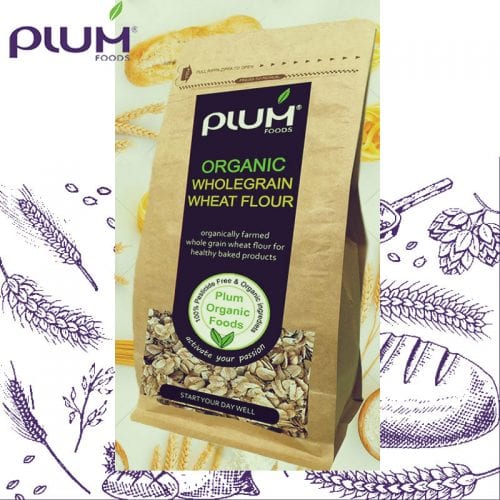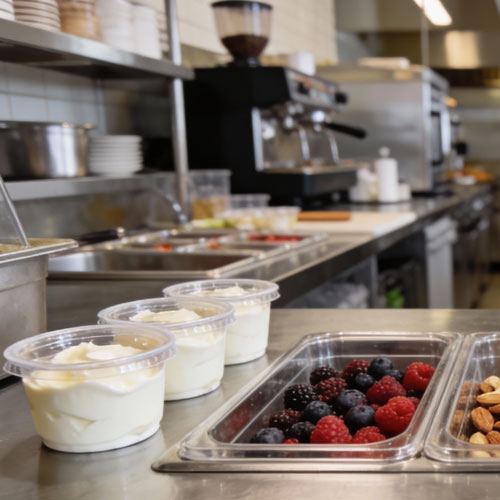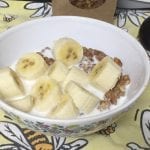Uncategorized
now browsing by category
Will Skipping Breakfast Help Me Lose Weight?

The jury is still out on whether breakfast is the most important meal of the day, but it has long been the most contentious. Most of its notoriety can be chalked up to timing and the fact that it coincides with the daily stampede out the door. Because let’s face it, there are often more pressing matters to attend to at the start of our day.
There are two main reasons that people skip breakfast. One is that we just do not have the time. Two is that we just aren’t that hungry. But also there is something else. Regardless of whether or not we could stand to lose a few pounds, we think to ourselves ‘Well, maybe those are calories I could do without’.
So there it is. But does skipping breakfast help you lose weight?
Intermittent Fasting vs Breakfast
But wait. There is now a third angle to consider in the great breakfast debate.
What used to be a fairly simple question about the various nutritional merits of breakfast has now become a confusion of seemingly conflicting advice. Skipping breakfast has been given a new air of respectability and a new name. It also comes with the full weight of social media behind it.
We are of course talking about intermittent fasting.
At first glance, it may look like intermittent fasting gives us a bonafide reason to go without breakfast, yet simply skipping breakfast is not the same. But what if the advice is not contradictory, and is instead another step forward in the evolution of our nutritional understanding?
Let’s take a quick look.
What are the benefits of intermittent fasting?
Intermittent fasting is thought to have major benefits for metabolic health.
- Increases insulin sensitivity.
- Reduces systemic inflammation.
- Lowers blood pressure
- Lowers cholesterol
What are the benefits of eating breakfast?
Eating a balanced breakfast is thought to offer a range of positive benefits.
- Boost energy levels
- Enhanced cognitive function
- Stabilise blood sugar levels
- Provide essential nutrients
Long-term studies have shown that individuals who eat breakfast tend towards better overall dietary habits and are more likely to meet their nutritional needs than those who skip it. For children and teenagers, a healthy breakfast is linked to improved academic performance and better school attendance.
The Effects of Skipping Breakfast
But what effect do the benefits above have on sustainable weight loss?
Weight loss is deeply complicated, with many interlocking factors at play. The mechanisms of eating, hunger, and weight control rely on a cascade of biochemical signals that are, in many ways, unique within each individual.
What happens when you skip breakfast?
Skipping breakfast is not just a missed opportunity to replenish your body with vital nutrients, but can lead to increased hunger later in the day. Left uncontrolled, hunger can often result in overeating or making poor food choices such as reaching for high-sugar snacks.
It may seem counterintuitive, but eating breakfast can help regulate appetite and help improve overall eating patterns, which in turn can potentially aid in sustained weight loss. Ultimately, while each person’s body reacts differently, consistently eating a balanced breakfast has been shown to promote positive health outcomes.
Read our in-depth article on what makes a healthy breakfast.
Is fasting in the morning good for you?
Intermittent fasting has gained popularity as a weight loss strategy due to its structured approach to eating and fasting. But does it support long-term weight loss?
Fasting encourages fat burning, by tapping into the body’s natural energy reserves. When you abstain from eating for a set period, your insulin levels drop. Lower insulin levels signal your body to use stored fat for energy, rather than relying on the glucose from your most recent meal.
The success of a fasting approach to food largely depends on a person’s ability to maintain the fasting pattern and ensure healthy food choices during eating windows.
Contradictory, much? Well yes, and no. Maybe we have been asking the wrong question. So, let’s try that again.
Is skipping breakfast the same thing as intermittent fasting?
It may come down to semantics but as ever the devil is in the detail.
The short answer is no; skipping breakfast and intermittent fasting are not quite the same thing, even if they might seem similar at first glance. Skipping breakfast is simply not eating your morning meal, which can happen for various reasons such as lack of time, appetite, or convenience. It doesn’t necessarily follow any structured routine or guidelines.
Intermittent fasting, on the other hand, is a deliberate eating pattern where you cycle between periods of eating and fasting. It is often more structured and can follow several different protocols, such as the 16/8 method, where you fast for 16 hours and eat within an 8-hour window, or the 5:2 method, where you eat normally for five days and significantly cut calories for two non-consecutive days in the week.
Intermittent fasting is a more planned and sustained approach that involves a consistent schedule. By contrast, simply skipping breakfast without a focused plan might lead to choosing unhealthy foods later in the day or consuming more calories to compensate, which can derail any potential benefits.
While both practices involve periods of not eating, intermittent fasting is a strategic approach aimed at health and weight management, whereas skipping breakfast is not structured and may not yield the same benefits.
How Weight Loss Works
To put this all into perspective, and find our own way towards sustainable weight loss, we need to understand how the mechanisms of weight loss (and gain) work.
It would seem that the more we learn about the complexities of human nutrition, the less we know. Somewhere along the way, we have managed to lose sight of the basic facts. The laws of physics have not suddenly changed, and the fact remains that to lose weight you need to consume fewer calories than your body burns.
How we turn food into energy
The building blocks of food are the macronutrients. These are carbohydrates (sugars and starches) protein, and fat. Fibre belongs to the carbohydrate group but it is useful to think of it separately.
Proteins are broken down into amino acids, which are used by the tissues that need them or excreted in the urine.
Fat is broken down into fatty acids and glycerides and then built back up as triglycerides. Some are used by the body straight away but mostly they go into storage.
Carbohydrates are broken down into simple sugars that the body can use. Mostly glucose. These are used for energy, or stored as glycogen. Glycogen storage (unlike fat storage) is limited, so what cannot be stored as glycogen is converted and stored as fat.
When you eat, the carbohydrates go straight to providing energy. Unless you have eaten way more than you need, in which case it goes into glycogen storage. Or even fat storage. Amino acids (protein) go off to do their thing, and fat mostly goes into storage for fuel.
Once the available glucose in the bloodstream has been used for energy, the body starts to draw from its stored glycogen. Because glycogen is always attached to water (at a ratio of 4 parts water to 1 part glycogen) you lose that too. This is why you are told that initial weight loss will always be water.
Once glycogen is used up, your body will start using fat as its energy source. But only if your intake is less than you burn. You don’t need to count calories but you do need to eat fewer calories than you use. And what your body uses will look very different to what someone else uses. There’s no such thing as an average body.
The bottom line here is if you keep exceeding your calorie limit, then you will continue to store fat. Unless you put yourself in an energy deficit then you won’t burn it. It is as simple as that.
So, surely all I need to do is ditch the carbs and switch to permanent fat-burning mode, right?
You would think so. But sadly, no.
Calorie restriction and compensation
Your body is designed to carefully regulate the balance between food intake and hunger. These mechanics are largely governed by the brain. In theory, this should make it easy to self-regulate our eating in a way that keeps us at an ideal weight.
It goes something like this.
When we restrict calories, the rate at which we burn them will reduce and the desire to eat will increase. This is ‘I’m hungry. Must.Find.Food.’
Conversely, when we consume too many calories the rate at which we burn them should increase, and our desire to eat should diminish. This is ‘No Thanks. I’m not hungry. I don’t need food.’
At a very basic level, this simple system kicks in for everybody. And what it means is that your body will do its best to sabotage your noble efforts to restrict calories.
That is why reducing your long-term calorie intake is so difficult. There are only so many calories you can go without before the internal mechanisms start compensating. It is an evolved starvation response that means your body does not want you to lose weight. And it’s going to fight you every step of the way. This is the reason nutritionists have long stressed the importance of a healthy balanced diet and gradual sustainable weight loss.
Palatability, satiety and reward
But there’s more. Beyond this simple, and unfortunately very effective, system of internal calorie control there are other factors at play which vary widely for each person.
If one side of the balancing mechanism should conserve energy in times of food scarcity, then the other side should have the opposite effect in times of abundance. Put simply, if we don’t need the calories then we shouldn’t feel hungry.
Yet we struggle with overeating. Some of us more than others. In short, our hunger responses have gone haywire.
Linked to this mechanism of hunger and satiety, are palatability and the mechanisms of reward. In very simple terms, palatability is how pleasurable you find a food. It feels good and it tastes good.
Satiety is the feeling of fullness. You have eaten enough and your body, in response to satiety, sends out the signals to tell you so.
And then there is reward. For some people, reward overrides everything else. The cravings and desire that lead to consuming way more calories than we need are all about reward. It is not a new thing, reward has been a part of eating since eating began. It leads us to the foods that will provide us with the most energy. It sends us in search of the honeycomb and warns us against poisonous berries.
Reward is not one signal. It is a multitude of neuronal pathways, all responding to different triggers. Fat, salt, and sugar. Even food additives. If you have returned from the supermarket with a smorgasbord of delicious-sounding foods that are often nothing more than the product of chemical wizardry, that’s your reward system at play. They are the biological equivalent of a funfair.
Anything other than a diet of whole, natural foods can overwhelm your reward and satiety signals, leading to a cycle of perceived hunger, cravings, and overeating. And most processed foods are designed to do exactly that. Of course, we can eat too much of anything, but a never-ending supply of hyper-palatable foods certainly does not help.
In his excellent book ‘Burn: The Misunderstood Science of Metabolism’ Herman Pontzer describes it as ‘the push and pull of palatability and satiety’. In other words, it is about finding nutritious food that you enjoy yet fills you up without exceeding your calorie budget. Or, put yet another way, avoiding the highly palatable foods that fail to flip the hunger switch.
And that looks different for each of us.
Breakfast and Weight Loss
Which brings us back to breakfast.
Unless you are eating an Atkins-style breakfast every day (something that is not recommended) the question of breakfast brings us to carbs. The backlash against carbohydrate foods, and a trend towards a low-carb or keto diet, doesn’t help the case for breakfast much. A trend that is driven by a misunderstanding of metabolism and the misplaced belief that we can bypass the system and become a mean lean fat-burning machine. And one that also has links with intermittent fasting.
Contrary to popular belief, a calorie is a calorie is a calorie. And as we have seen, the only way to lose weight is to restrict the number of calories you eat. That part is non-negotiable and there is no quick fix. It doesn’t matter where those calories come from; the mechanism of energy in and energy out remains the same.
Eating into your fat stores is simply not sustainable indefinitely. Partly because to do so you need to be in a calorie deficit. Which as we have seen, does not work in your favour when it comes to weight loss.
Carbohydrates in the diet
As one of the three macronutrients, carbohydrates are not something we can live without. They are not just a valuable source of energy, but carbohydrate foods (ie plants) are also our source of fibre. And fibre is one of the most important parts of our diet.
An overindulgence in refined carbohydrates may be partly what fuelled the obesity crisis in the first place but that does not mean there is no place for carbs in the diet. They may all end up in the body as glucose, and as we have seen too much of that will end up as body fat, but it is how they get there that counts.
Fibre, especially when it comes in the original package of the whole plant, slows down the breakdown and release of glucose into the bloodstream, providing a slow release of energy without the insulin spikes. Fibre also has an invaluable role to play in the health of your gut microbiome.
So whilst a diet of white sliced bread won’t do you any favours, a wide variety of fruit, vegetables, and wholegrains will.
Read more about the benefits of wholegrains
That said, how much of your dietary intake comes from carbs is a very individual thing. Finding the perfect balance is not something you will achieve over a few weeks, a few months, or even a year. However, it is probably safe to say that any extreme dietary restrictions will come back to bite you in the long run.
Some people find they do well by limiting carbs, in terms of weight loss and how well they feel. Others may feel that they function better when they add more carbohydrate foods to the mix. Quite often an understanding of the importance of fibre, and the role of gut health, can be the catalyst to re-evaluating the place of carbohydrates in their diet.
Choose quality food over quantity
Again, it comes down to the quality of the food you eat. Finding the right balance of macros for you, and a limited reliance on processed foods.
You need to find your own sweet spot of energy balance, whether you are trying to lose weight or maintain a healthy weight. Your body will compensate if your balance drops too low into the negative. On a day-to-day basis, your weight will fluctuate, but if the scales are consistently showing that weight loss has stalled or not moving in the right direction then you need to make some adjustments to what or how you are eating.
Breakfast is important (at any time of day)
The only way to weight loss that works is the one that works for you. Which takes long-term commitment, with wins and fails along the way. Trial and error, and listening closely to how your body responds. And yes, watching the scales.
Armed with our outstanding of how weight loss works, let’s take another look at the metabolic benefits of intermittent fasting along with the nutritional benefits of breakfast.
The benefits of intermittent fasting (those metabolic markers such as insulin sensitivity, inflammation, triglycerides and cholesterol) are all shown to improve with significant weight loss. Regardless of how you get there. Intermittent fasting may well turn out to show improved metabolic markers beyond those relevant to weight loss but the science is new and only time (plus long-term studies) will tell.
What the extended fasting period does is knock out the three square meals a day scenario. Which involves reevaluating the way you eat rather than in terms of skipping a meal. As long as you control what you eat, and how much of it, it may certainly help reduce your overall calorie intake.
Finding room in your diet for the recommended breakfast foods of whole grain cereals, plus some fresh fruit, and a portion of dairy is never a bad thing. They remain an ideal way to break your fast, as they are easy on digestion and a source of slow-burning energy. Yet whichever way you choose to organise your meals, these are vital nutrients that you may miss out on otherwise.
Read about the benefits of cereal and milk as breakfast foods.
Don’t forget that extending your fasting period doesn’t necessarily mean not eating until lunch. It works on both sides of your natural fasting period when asleep. Depending on your lifestyle, it could be more about not eating in the evening, than not eating in the morning.
Will Skipping Breakfast Help Me Lose Weight?
In conclusion, the short answer to the question ‘Will skipping breakfast help me to lose weight’ is pretty much no. As we have seen, simply skipping breakfast suggests a haphazard approach to eating that is (at best) based on an outdated, reductionist, understanding of calorie restriction. We now understand that a more mindful and measured approach to eating is a far more effective route to permanent weight control.
Learning to listen to your body’s cues, eating when you are hungry (but not over-hungry) and understanding what works for you as an individual are all part of the new playbook.
Intermittent fasting is not simply an excuse to skip breakfast, but another tool to help you find a way of eating that works for you. The need to break your fast is not going anyway any time soon. It just becomes a question of when and how you do that.
So it looks like breakfast could be the most important meal of the day after all.
Explore our range of healthy cereals and see if they can help support you on your weight loss journey.
This article was reproduced on this site with permission from operafoods.com.au the “Healthy Cereal Wholesalers”.
See original article:- Will skipping breakfast help me lose weight
Whole Grain Wheat Flour- A Plum Organic Special Ingredient

Plum Foods is a long established Australian brand dealing in Gourmet foods and healthy breakfast cereals. Muesli and Granola of different varieties and flavors are our top range of products for discerning health food lovers.
Our Organic Whole grain wheat flour is a high nutrient product which contains antioxidants and minerals in a large amount. They are a good source of some essential minerals such as Calcium, Iron and Selenium. Whole grain wheat flour is a 100% whole wheat product they also contain dietary fibre, protein fibre and manganese.
All our products meet the basic criteria for healthy cereals which have been certified by HACCP. There is no added sugar, sweeteners, colors or preservatives but all our products are Australia made using only natural wholefood ingredients.
Two of our products have been globally recognized and awarded gold medals at the Great Taste awards of UK for its taste, quality and standard.
Try our Organic Whole grain wheat flour in your own recipes. The brand Plum Foods is a wholly owned subsidiary of fine food wholesalers Opera Foods.
Plum Foods Xmas Cakes 400g for Gourmet Gift Baskets
Plum Foods offer a gorgeouse small 400g Christmas Cake in a size that is perfect for a slice each for around 6 people.
Our Christmas cake is rich and fruity and moist, marinated and filled with dried fruits and almonds and is a natural long life product.
We make these to order for Christmas and invite bulk orders by end of September each year.
The Plum Foods 400g Christmas cake is a perfect size for retailers as it popular in size. Ideal impulse buy sellers for greengrocers, delicatessens, and perfect for gourmet gift baskets.
Order your Christmas cakes in boxes of 12 early for next season.
Plum Foods is a subsidiary of fine foods wholesaler & manufacturer Opera Foods
#christmascake #xmascake #plumfoods #operafoods
Soup of the week : Coconut Curry Soup
I had my grandsons birthday in Sydney on the Friday night held at The Pinnacle Restaurant at the South Hurstville RSL Club. My diet calls for a soup, however I didn’t find a soup I liked, so I went for a simple small rump with veggies (quite nice) but next came the first big divergence from the diet with a thin slither of the beautiful chocolate mouse birthday cake, but I did share a little of it with Aniko.
As it turns out this cake was originally a tart designed by Aniko for Planet Hollywood‘s original Sydney opening 20 years ago, back in 1996. It now has a slightly different top on it, but its the same seriously rich Oreo Mousse Tart still made for Sydney cafes and restaurants by Epicurean Kitchen Handmade Cakes, which business we sold to my daughter and son-in-law in 2002 .
As I am in Sydney, Saturday is soccer day with my 3 grandsons playing at three different fields locally, so I did a fair bit of walking to and from the car and a lot of standing watching them play. It was great to see them go around but it was hard on the sore heel, so on Saturday & Sunday I did no biking or treadmill exercise.
Overall I have started out well with the exercise plan, also the biking immediately before the treadmill seems to warm up the muscles and reduce stress on the feet. Also I have discovered that if I turn it down to a slow pace, then its helps keep the weight on the ball of the foot and off the sore heel.
I made a couple of exercise time increases, and have now done 10 minutes of each, total 20 minutes, for 2 days in a row. I didn’t really intend to increase the level so quickly because I was afraid of getting back to a level where I couldn’t walk on it, but watching TV whilst doing it lets the minutes slip by. So once I realised I could do it, I have kept it up. I am still treating the ankle and heel area with anti inflammatory cream and still have a soreness but its certainly no worse, and yet I am now getting the benefit of some exercise.
Soup of the Week
My soup of the week was a beautiful curry and coconut soup that Aniko made. She says I can eat as much of it as I like in my diet plan as it contains only no nasty’s. I was starving by dinner time last night and had already cheated with a handful of salted peanuts, so I was really ready for the soup. I found her Coconut & Curry soup very tasty and satisfying with the curry giving it a little bit of zip that takes care of cravings. She finished me off with a bonus handful of black grapes.
Recipe: Coconut Curry Soup.
Ingredients: Ground Almonds, chopped Cauliflower, onions, curry powder, Spices: cumin, turmeric, cinnamon, 250ml coconut milk,
Heat some olive oil and drop in onions to brown them lightly, then add the spices, water, cauliflower, ground nuts, simmer and add 2-3 teaspoons of curry powder and 250ml of coconut milk. Serve Hot with salt & pepper to taste.
The Gourmet Muesli Diet.- A weight loss lifestyle plan
The Gourmet Muesli Diet.
If you are getting on a bit, and overweight, it might be time to have a good hard look at yourself ? The only way to really get healthy is to eat and exercise right and get yourself to a healthy weight that is not straining your organs.
You don’t have to do anything extreme to achieve a healthy body. You dont need a diet or an exercise regime that stresses you. You just need a healthy attitude and a moderate eating and exercise mindset to gradually pull your body back to a healthy level and ensure you can enjoy life a lot longer.
One of the main ways to do that is with convenient foods that are natural wholefoods and one of the most convenient meals you can make is a granola or muesli bowl topped with fresh fruit & yoghurt. Unless your eating one of those sugar loaded commercial brands from the supermarket, its an easy healthy breakfast.
What Should I weigh?
A standard BMI index test uses your height and frame structure to indicate what the ideal weight for your particular body is. Its not an exacting science but can be quite revealing to those who have let the kilos accumulate as they age.
According to the BMI index, for my height and age and frame structure for example , I should be about 88kg. When I was 21 years of age however , I was a skinny thing about 80 kgs, so I figure that I could now be 80-90kg and still reasonable. When you work out your BMI index you will have a pretty good idea of what you should weigh. You can google a BMI index calculator easily. So if you have a long way to go to get to a healthy weight, then you need a serious plan.
What is the Plan.
Many people have had many failed diets over the years and its not until you decide that you need a lifestyle change and an eating style change that you will get steady weight reductions rather than a yo yo diet that really will stress your critical organs.
Go for a middle of the road eating plan that’s more of a lifestyle change and not hard to manage, but write it down and track it and talk to yourself about it regularly to ensure you stick to it.
Plum Foods sells a range of gourmet muesli and gourmet granola which are perfect dietary base foods and its a solid start to base a dietary lifestyle change on a gourmet muesli/granola breakfast to start each day with an energy packed breakfast that will give you longer endurance throughout the day with low GI ingredients.
Most importantly you should publicly declare your lifestyle diet, so that your friends and family and maybe even fellow staff and customers, who feel the need, can encourage you, or berate you. So tell them “whenever you see me, please demand to know if I have lost weight this week“.
Here is our simple weight loss lifestyle plan
MONTH ONE PLAN – NO SNACK FOODS – N0 DESERTS – NO COOKIES
Breakfast: Plum Foods Gourmet granola – Maple Nut Crunch, 100g with A2 milk or yoghurt & Coffee
Mid morning : Coffee or tea (perhaps a good Matcha Tea) , plus 1 small piece of fruit if you had no fresh fruit on the granola.
Lunch: Cold Chicken salad. (one piece of chicken, cheese, lettuce, olives, cucumber, tomato, onion)
Mid afternoon: Tea. 2nd small piece fruit
Dinner (by 6:30pm): 1 Big Soup, No Main. (2nd small piece of fruit can follow if not taken in afternoon)
Morning Exercise: Exercise bike or treadmill 15 minutes, increasing each week by a minute until you are doing 30 minutes daily. Or at least 5 days per week. (People might say get outside and walk in the fresh air, but with a big TV in front of your treadmill you might find that its less of a chore and you will have done 15 minutes before you know it, if your entertained.).
MONTH TWO ETC
Repeat. Change up the light lunch and get variety in your evening soups. Try a different Plum Foods granola or muesli. (their all low sugar, wholefoods that are blended to give you a healthy nutritious meal). This is your eating lifestyle now.
Why not order a carton of muesli, granola or porridge oats from Plum Foods and be prepared for Easy healthy breakfasts for a month or two.






